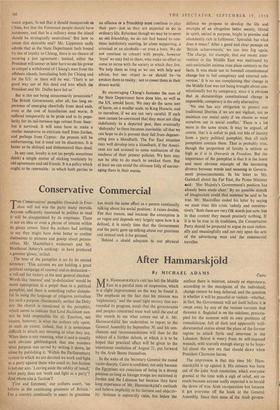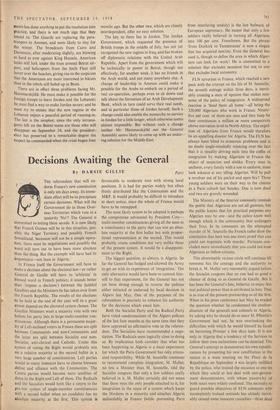After Harnmarskjold
By MICHAEL ADAMS Cairo MR. HAMMARSKJoLD'S visit has left the Middle East in a painful state of suspension, which is a slight improvement on the way he found it. The emphasis on the fact that his mission was 'exploratory,' and the usual tight secrecy that sur- rounded its progress, mean that the governments and peoples concerned must wait until the end of this month to see what comes out of it. Mr. Hammarskjold has undertaken to report to the General Assembly by September 30, and his con- clusions and recommendations will then be the subject of a further debate, at which it is to be hoped that practical effect will be given to the unanimous resolution of August 21, put forward by the Arab States themselves.
In the wake of the Secretary-General the mood varies sharply. Cairo is confident, not only because the Egyptians are conscious of being in a strong position so long as foreign troops are stationed in Jordan and the Lebanon but because they have long experience of Mr. Hammarskjold's methods and believe implicitly in his fairness and objectiv- ity. Amman is outwardly calm, but below the surface there is mistrust, anxiety or expectancy, according to the standpoint of the individual; change cannot be long deferred, and the question is whether it will be peaceful or violent—whether, in fact, the Government will act itself before it is swept away by any of the various 'currents that threaten it. Baghdad is on the sidelines, preoccu- pied for the moment with its own problems of consolidation, full of dark and apparently well- documented stories about the plans of the former regime to attack Syria and intervene in the Lebanon. Beirut is weary from its self-imposed wounds, with scarcely enough energy to be hope- ful about the new era that should dawn when President Chamoun leaves.
The impression is that this time Mr. Ham- marskjiild is up against it. His mission was born out of the joint Arab resolution, which everyone greeted at the time with a sigh of relief, not so much because anyone really expected it to herald the dawn of true Arab co-operation but because it got everyone off the hook at the General Assembly. Since then none of the Arab govern- ments has done anything to put the resolution into practice, and there is not much sign that they intend to. The Guards are replacing the para- troopers in Amman, and seem likely to stay for the winter. The broadcasts from Cairo and Damascus, after moderating slightly, are blowing as hard as ever against King Hussein. American tanks still lurk under the trees around Beirut air- port, and helicopters from the Sixth Fleet still hover over the beaches, giving rise to the suspicion that the Americans are more interested in bikinis than in the rebels still holed up in Basta.
There are in effect three problems facing Mr. liammarskjold. He must make it possible for the foreign troops to leave Jordan and the Lebanon; he must find a way to make Jordan secure; and he must try to ensure that the new regime in the Lebanon enjoys a peaceful period of running-in. The last is the simplest, since the only intransi- gents left on the Beirut scene are those who will disappear on September 24, and the president- elect has preserved to a remarkable degree the respect he commanded when the crisis began four months ago. But the other two, which are closely interdependent, offer no easy solution.
The key to them lies in Jordan. The Jordan Government, which requested the presence of British troops in the middle of July, has not yet recognised the new regime in Iraq, and has broken off diplomatic relations with the United Arab Republic. Apart from the government which will be technically in power in Beirut, though not effectively, for another week, it has no friends in the Arab world, and not many anywhere else. A change of leadership in Amman could make it possible for the Arabs to embark on a period of real co-operation, perhaps even to sit down and talk about the formation of an Arab Development Bank, which in turn could serve their real needs, and in particular those of Jordan herself. Such a change, could also enable the monarchy to survive in Jordan for a little longer, which otherwise seems almost impossible. But without such a change neither Mr. Hammarskjold nor the General Assembly seems likely to come up with an endur ing solution for the Middle East.



































 Previous page
Previous page